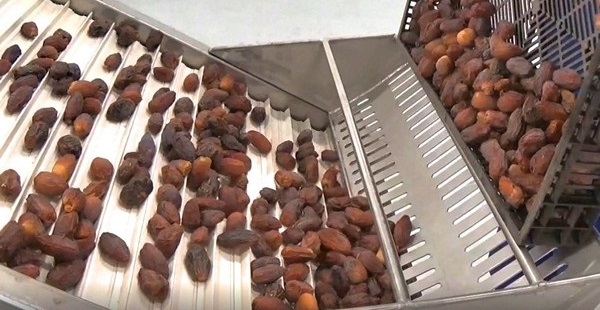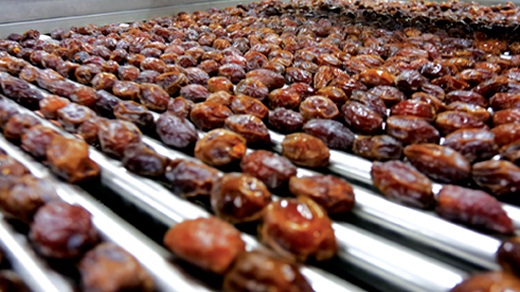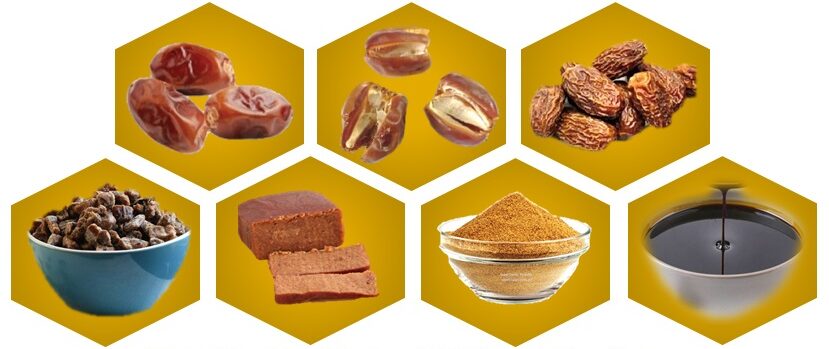The Dates Processing Industry in Pakistan has significant potential to thrive, providing a diverse spectrum of high-quality products.
Date Cultivation
Pakistan stands as a prominent global hub for date production, boasting over 250 varieties cultivated across the nation. The country’s advantageous climate, fertile soil, and optimal growing conditions create an ideal landscape for date farming or cultivation either conventional or organic, embraced by all four provinces. Sindh and Baluchistan emerge as leading producers, showcasing a diverse array of date types.

Various regions in Pakistan contribute to the rich tapestry of date cultivation, including Turbat and Panjgoor in Baluchistan, Khairpur and Sukkur in Sindh, Muzaffargarh, D.G Khan, and Jhang in Punjab, and D.I. Khan in KPK.
The Date Industry
The Pakistani date industry spans a wide spectrum of products, encompassing pitted dates, diced/chopped dates, decapped dates, date paste, macerated dates, block-pressed dates, dates energy bars, organic dates, and stuffed dates with premium nuts like almonds, pistachios, walnuts, and peanuts. These products are meticulously crafted in processing plants across the country and find their way to international markets.
At the core of Pakistan’s economy, the date industry flourishes, leveraging the nation’s conducive climate and growth conditions. With over 250 date varieties, ranging from Aseel to Begum Jangi (BJ) dates, Pakistan caters to diverse palates globally. Notably, the industry’s contribution extends beyond raw dates, as it exports a wide spectrum of processed date products, securing a significant foothold in the global dates market.
Types of Dates
Dates come in two main variants: dry dates, known as ‘chuara,’ and soft dates, commonly referred to as ‘khajoor‘.
Dry dates take center stage in terms of both volume and value, navigating through the bustling date markets of Khairpur and Sukkur. More than 200 traders, nearly two dozen exporters, and around 5,000 workers actively participate in handling this prized produce.
Soft dates undergo meticulous processing in local dates factories, numbering 20 in total, with 10 actively engaged in exports. Each factory, employing an average of 200 workers, adds up to a workforce of 4,000 individuals. These dedicated workers, earning Rs700 to Rs1100 daily, contribute their expertise to various processing tasks.

Dynamics of Dates Processing
Interestingly, a significant portion of processing activities, including grading, cleaning, pitting, and dicing, also unfolds in homes and cottages. This decentralized workforce, estimated at 12,000 to 15,000 individuals, predominantly comprises women, playing a pivotal role in handling two times more volume than their factory counterparts.
Beyond the formal processing hubs, the date industry has given rise to over 200 highway shops peddling dates and their derivatives. These establishments boast daily average earnings ranging from Rs2,000 to Rs5,000.
In essence, date farming emerges as a transformative force, benefitting numerous households. Women, in particular, find meaningful opportunities for employment, contributing significantly to household income and experiencing financial empowerment. The reach of date cultivation extends beyond Khairpur, expanding into Sukkur, Ghotki, and Naushahro Feroze districts of Sindh. Employing traditional cultivation methods, growers meticulously nurture date palms for two to three years, ensuring optimal spacing and environmental conditions for quality fruit-bearing.
In summary, the Date Processing industry in Pakistan plays a pivotal role in enhancing exports, implementing modernization for value addition, generating employment, empowering women, alleviating poverty, and fulfilling various other functions.
Therefore, there is a pressing need for support from engineering platforms to enhance processes, ensuring improved output levels and high-quality end products. Financial institutions should also play a crucial role in funding initiatives to meet export demands. Additionally, the cultivation of dates warrants attention, urging the adoption of advanced farming methods and technology to enhance harvest quality and protect crops from natural and climatic disasters.
It is essential for the government and its associated departments to provide unwavering support to these initiatives, contributing to the achievement of overarching national economic goals.
Authored by Abdul Qayoom Memon – CEO GNS PAKISTAN
Date: November 14, 2023
